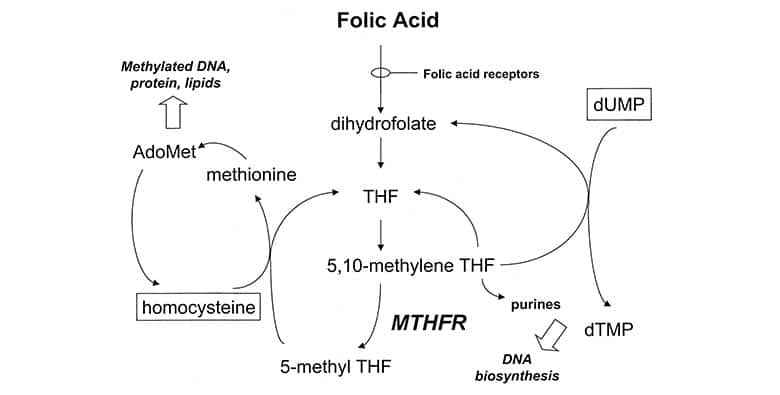I am about to commit functional medicine blasphemy. I am about to tell you something, well, not very nice. Are you ready? Here it is: You are not an MTHFR. If you are a frequent flyer of the functional medicine blogosphere you know I am talking about methylenetetrahydrofolate reductase, or, more specifically the gene that codes for this enzyme (by the same name). If you are not already familiar with “MTHFR” let me back track a little bit. This gene has been getting the spotlight for the past couple of years because it is a critical step in a biochemical pathway that involves the vitamin folate and two amino acids, homocysteine and methionine. MTHFR has reached all-star status in the hall of fame of genetic variations (called “single nucleotide polymorphisms”). It turns out that if a person has one or two copies of a variation of this gene they may not be able to convert folic acid into a form called 5-methytetrahydrofolate through transfer of a methyl group (a process called “methylation”), and as a result the conversion of homocysteine back into methionine is impaired, or at least not optimal. (Kind of like only being able to drive your stick shift car in 1st, 2nd, and 3rd, but not 4th or overdrive.) If you are not a biochemist or a functional medicine geek of the highest order (like me) you may be asking yourself why should I care? Give me your attention for just a few more minutes. The reason all this is important is because this simple conversion of homocysteine to methionine is like a lynchpin. This little biochemical pathway influences other key biochemical pathways that are involved in things as diverse as the building and breaking down of neurotransmitters (those chemicals that allow your brain cells to communicate with one another and which play a role in things like thoughts, emotions, and movement), the creation of glutathione (a critical antioxidant and key player in detoxification), and the silencing of sections of DNA. There is a long list of conditions associated with impaired methylation, and while this transfer of a methyl group (a carbon with three hydrogens attached) involves several enzyme reactions, the homocysteine-methionine cycle is like the first domino when several tiles are strategically lined up one in front of the other. When the first goes, all the others fall suit.
A couple of days ago one of my former medical school classmates sent me a long text message explaining that she and her family had all paid for the service provided by 23andMe, and had their own genomes decoded. With the digital file that is their personal genome they ran it through Prometheus, one of several similar services, and received a print out of a list of select genes and the variations of these genes – the single nucleotide polymorphisms. My friend was stuck because she did not know what to do with the information and she needed someone to tell her – as she put it – how to use supplements for health and longevity based on her genetic profile. Unfortunately, it does not work that way.
Understanding what makes the biochemical pathways vulnerable
Here’s the thing: You are not an MTHFR. You might have one of the variations in the MTHFR gene that results in the enzyme, also called MTHFR, that has the possibility of decreased enzymatic activity. Or, you might have the gene variation, but the enzyme is working…just fine. This is the “function” in functional medicine. You can fine tune your supplements to address the vulnerabilities of the biochemical pathways, but it is even more powerful to understand what makes the biochemical pathways vulnerable, and it is not just the genes. Look, I am not here to dismiss the importance of MTHFR or other single nucleotide polymorphisms that get attention in functional medicine. But I am here to say YOU (yes you) are more than your genes. You are a beautiful symphony – the strings, the horns, the percussion, the reed section – and the sum is more than the individual parts. Often, in functional medicine we start with food because food is powerful, holistic medicine and it is information to our cells, including our DNA. In my practice I emphasize an understanding of the autonomic nervous system with its “fight or flight” and “rest and digest” parts because too often we are mostly the former and not enough of the latter and that wreaks havoc on multiple biological systems – communication (like hormones), energy (like our mitochondria), assimilation (like our microbiome) and defense (like our immune system), for example. I emphasize movement because it has a similar powerful medicine effect on the body.
When you come to my office and tell me you are an MTHFR, I want you to know you are not. I want you to know that in your wonderful complexity—your Mozart, Bach, and Beethoven—you are so much more than your genes. I want you to know you have the ability to make truly great music with your life.
Ken Sharlin, M.D.

